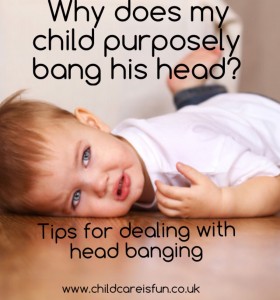
Why does my toddler purposely bang his head?
Surprisingly, this is one of the most common questions I get asked by worried parents. It really is more common than you think!
Head banging (banging the head on cot bars, walls, floor or any object) often starts around 18 months, but can start sooner. The ‘head banging’ can last for several weeks, or even months, but the majority of little ones have stopped this behaviour by the time they are 3 years old.
Reasons for head banging include:
- Comforting: As crazy as that sounds – many tots find the rhythmic movement of head banging white comforting. It often starts during the night when they are self setting in the light sleep phase. The head banging simulates a rocking motion – just like some toddlers rock on all fours in their cots, a ‘head banging’ toddler will take comfort in banging their head.
- Pain: This is the more common reason for head banging behaviours. Often with teething or head pain, little ones will bang their heads to relieve the pain.
- Attention seeking: Often with the arrival of a new sibling comes attention seeking behaviour. Totally normal to show attention seeking, but worrying for any parent seeing it turn to head banging. This often disturbing behaviour -gets attention far quickly than shouting or crying, and toddlers learn quickly that it works.
- Frustration: Often tantrums get to a level that little ones cannot contain and so they explode. That volcano of frustration just bubbles up and the only way they can cope is to lash out or indeed, bang their head. Often the relief of head banging calms them down and they stop. However – if the head banging is hard, it can cause even more upset.
- Special needs: Head banging can be associated with autism and other developmental disorders, having said that, please don’t panic – as head banging alone does not indicate a developmental problem. It goes together with other issues.
How do I stop my toddler from head banging?
- Try not to worry: Although your toddlers’ head banging isn’t nice to see and can cause you great distress, try and remember it is a phase and it will pass. Your little one may get a bruise or two but take comfort in the fact that head banging is usually self regulated behaviour – your toddler will have a limit and won’t bang themselves so hard that they cause major injury. Sadly, the more you worry and stress infant of them about their behaviour, the more likely they will react using head banging. It can often be a vicious circle!
- Attention at the right time: Reward all of the positive behaviour, and ensure your toddler is getting lots of positive attention from you when he’s NOT banging his head. When head banging starts, try not to make a big deal out of it – walk away (but so that you can still see) so the focus shifts. Don’t draw attention to it or make comment. Of course when it stops give lots of cuddles – but don’t mention the head banging. Distraction: If your little one looks like he’s going to start head banging – use distraction. The distraction technique works wonderfully when tantrums are about to start too! Have their favourite book handy, or Tv show for a minutes distraction.
- Protect your child from injury: If your toddler is head banging in their cot – ensure their are no sharp points, screws or anything he can really injury himself on. Don’t be tempted to put pillows or blankets in his crib to soften his surroundings, because these are a suffocation hazard.
- Find different comforts: If your toddler is banging his head as a way of self-comforting, try some different comforts such as music or baby massage. Get into a great bedtime routine with lots of calm and comfort so your toddler doesn’t feel the need to self-comfort in this way.
Finally, if your toddlers head-banging becomes out of control, causes worrying injury or becomes more frequent and you have serious concern – contact your GP.









